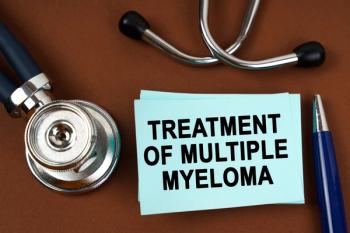
Study: Keytruda Effectively Treats Aggressive Forms of Endometrial Cancer
About 48% of individuals experienced a complete or partial response when treated with pembrolizumab, and about two-thirds also had a response that lasted more than 3 years.
Pembrolizumab (Keytruda, Merck), a cancer immunotherapy drug that is FDA-approved to treat several forms of cancer, also effectively treats aggressive forms of endometrial or uterine cancer, according to results from an international phase 2 clinical trial led by investigators at
The study included 90 women diagnosed with advanced recurrent endometrial cancer to determine whether the drug could be used effectively to treat this subset of individuals with microsatellite instability High (MSI-H) or mismatch repair deficient (dMMR) or tumors.
The individuals included were from 38 different hospitals in 15 countries.
Pembrolizumab works by inhibiting certain cellular receptors that prevent the immune system from recognizing and destroying cancer cells.
The FDA has approved pembrolizumab for several other cancers, such as cervical, head and neck, lung, melanoma, and stomach cancers.
In the OSUCC study, investigators showed that approximately 48% of individuals with advanced endometrial cancer experienced a complete or partial response. Approximately two-thirds of these individuals also had a response that lasted more than 3 years.
In addition, approximately two-thirds of all patients in the study had a clinical response.
The median follow-up was 42.6 months, making this study the longest follow-up reported to date.
“These findings suggest a long-term benefit to patients. Even the potential for curative intent is now possible in patients with recurrent or metastatic uterine cancer,” David O’Malley, MD, a gynecologic oncologist at the Ohio State University Comprehensive Cancer Center Arthur G. James Cancer Hospital and Richard J. Solove Research Institute, said in a statement.
Clinical trials to evaluate whether pembrolizumab effectively treats earlier-stage disease are under way.
Endometrial cancer is the second most common form of cancer in women worldwide, according to the statement.
Although platinum-based chemotherapy regimens can be effective, many individuals experience a recurrence.
Effective second-line therapies for metastatic or recurrent disease are limited, which results in a 17% 5-year survival rate for women with advanced or recurrent disease.
Previous research suggests that up to 31% of individuals with endometrial cancer have MSI-H and dMMR changes, according to the statement.
In this group of individuals, these are inherited mutations in one of the MMR genes.
“By targeting this damaged pathway with this targeted drug, we can reset the cellular mechanisms and allow the immune system to reactivate and attack the cancer cells,” O’Malley said, adding that this mutation is usually present in the tumor, and it is not a genetic mutation.
Prior to the data from this study, there was no accepted standard-of-care second-line therapy for individuals with endometrial cancer with MSI-H- and/or dMMR-positive tumors.
Investigators noted that the overall response rate of this study is very strong compared with the 10% to 15% expected response rate resulting from other chemotherapy agents that are most often used as second-line therapies.
The findings were published online in the Journal of Clinical Oncology.
The study was sponsored by Merck, the manufacturer of pembrolizumab.
Reference
Immunotherapy drug shows promise in advanced endometrial cancer. EurekAlert. News release. January 6, 2022. Accessed January 7, 2022. https://www.eurekalert.org/news-releases/939420
Newsletter
Stay informed on drug updates, treatment guidelines, and pharmacy practice trends—subscribe to Pharmacy Times for weekly clinical insights.








































